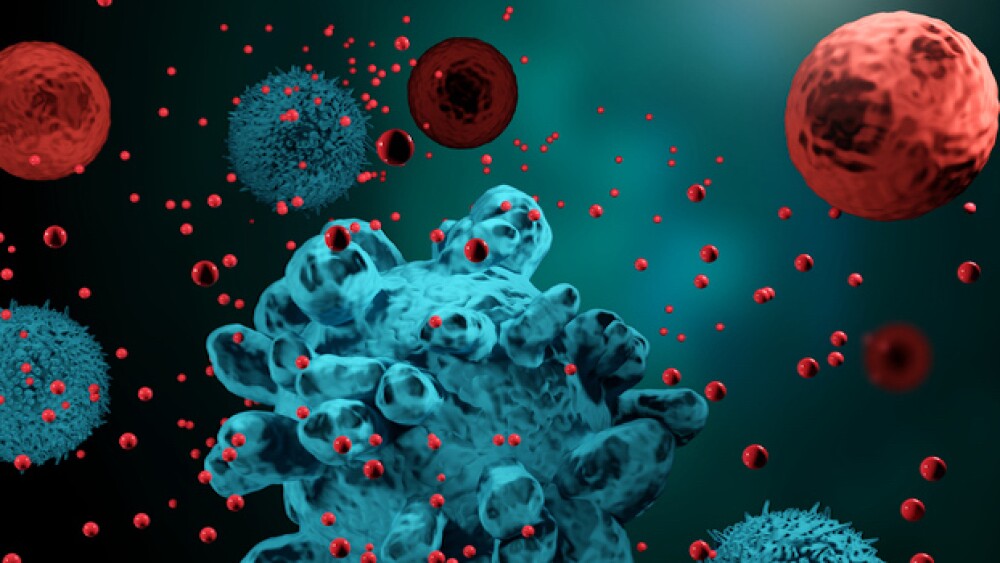Following the FDA’s November announcement of an investigation into 20 cases of T cell lymphoma recipients of CAR-T therapies, a cadre of cancer and cell therapy leaders published their assessment in Nature.
Pictured: Cell therapy concept/iStock, Meletios Verras
CAR T cell therapy is lower risk than other cancer treatments, according to a prominent group of cancer and cell therapy leaders who published their commentary in Nature Tuesday, a little more than a month after the FDA announced it was investigating the “serious risk” of T cell malignancies in patients who received such treatments. But more information is still needed, the authors stressed.
Specifically, current and past presidents of national and international cell therapy organizations collectively stated that “the benefits of CAR-T therapies continue to outweigh the potential risks in the vast majority of cases.”
The question remains whether the CAR T cell therapy caused the secondary cancers reported, but FDA Center for Biologics Evaluation and Research Director Peter Marks noted that it’s likely. “It does look like there’s a causal relationship,” he said during the Alliance for Regenerative Medicine’s annual Cell & Gene State of the Industry Briefing at the 42nd J.P. Morgan Healthcare Conference. However, he hastened to add that “it’s not overly concerning to us in this malignant setting right now.”
Lead author of the Nature commentary Bruce Levine, like many in the oncology community, emphasized this point as well. “We have to remember who the patients are who are receiving CAR T,” said Levine, founding director of the Clinical Cell and Vaccine Production Facility at Penn Medicine’s Center for Cellular Immunotherapies. “These are patients who are relapsed/refractory who have very few, if any, options.”
Is the FDA’s concern warranted?
On Nov. 28, the FDA stated it was investigating 20 reports of T cell lymphoma in patients who had previously received CAR-T therapies, STAT News reported. And this week, Marks said the number had grown to 22 by the end of 2023. According to the authors of the Nature paper, more than 34,400 patients have received these therapies. The commentary references post-authorization safety studies, recorded by the Center for International Blood and Marrow Transplant Research. Of 8,060 recipients of commercial CAR-T cells followed for a median of 13 months, three had documented T cell malignancies as of Dec. 14, 2023.
However, Levine told BioSpace that the two voluntary reporting databases, the FDA Adverse Event Reporting System (FAERS) and the Center for International Blood & Marrow Transplant Research (CIBMTR), contain “only a fraction” of outcomes from the total patients known to be treated. “We have some information, but not nearly enough,” he said.
The authors note that much is still unknown about the T cell lymphoma cases; they list age, prior therapies, immune status and time from CAR-T infusion to the development of the lymphoma as important patient characteristics to consider in assessing the therapy’s risk.
Levine said he wants to know how many of the cancers are CAR-positive—and if they are CAR-positive, where the insertion is—and whether the CAR is a passenger or a driver of the subsequent malignancy. Such information “tells us how we might think about screening and treating patients” and could potentially inform the use of vectors or vector design, he said.
The Path Forward
The authors estimate that long-term side effects, including potentially cancerous mutations, occur at “a much higher rate” with standard chemotherapy and radiotherapy than with CAR T cell therapy. Levine said he couldn’t rank the relative risk of CAR T cell therapy compared to other immunotherapies until additional data are gathered.
With so much still unknown, Levine said the group decided to put out the commentary now “to encourage reporting to the voluntary databases and to the FDA, and when cases are discovered, to proceed with very thorough investigations to get out the potential causes.”
For now, Levine said that at the University of Pennsylvania, they will continue to prescribe CAR-T therapy to patients as they have in the past, “keeping in mind what’s going on in the background with these cases.”
Heather McKenzie is a senior editor at BioSpace. You can reach her at heather.mckenzie@biospace.com. Also follow her on LinkedIn.






